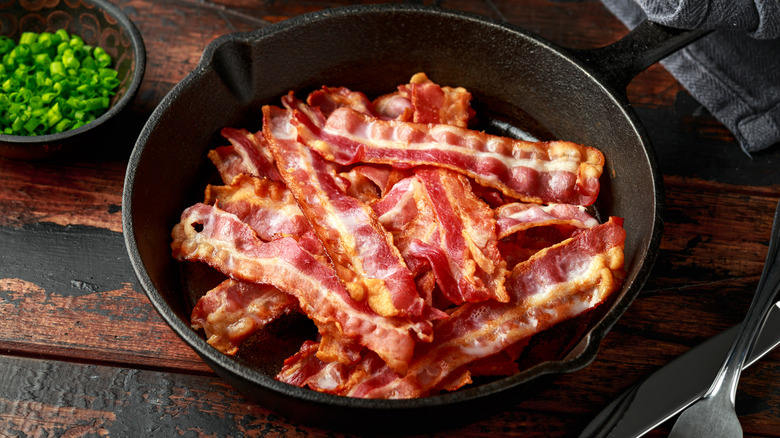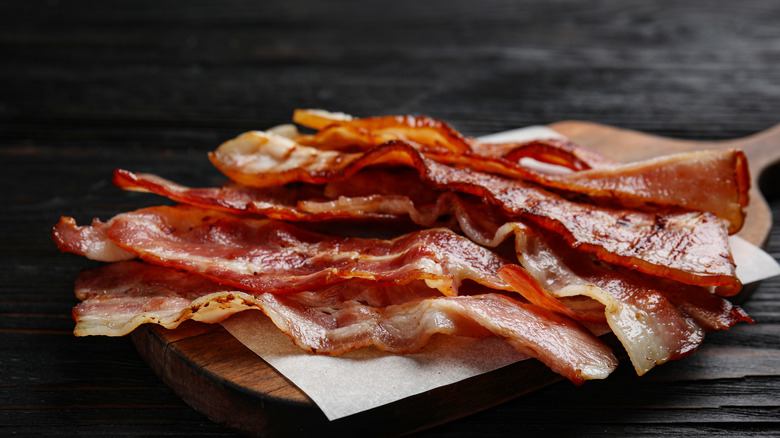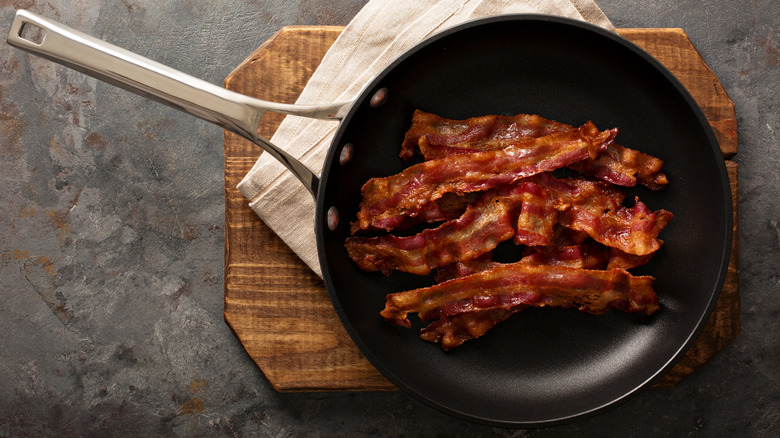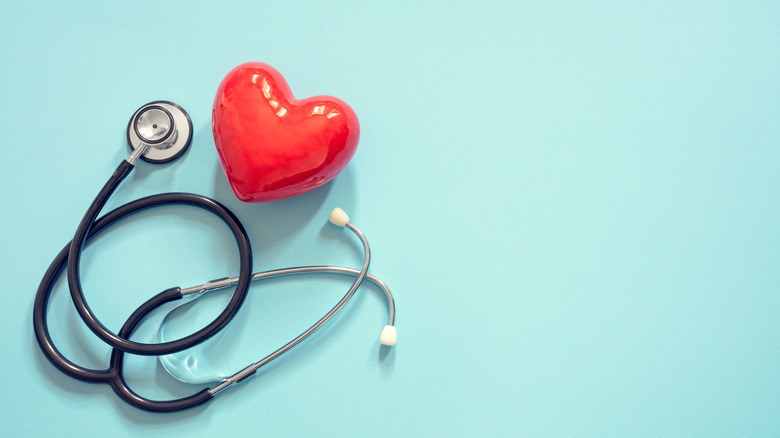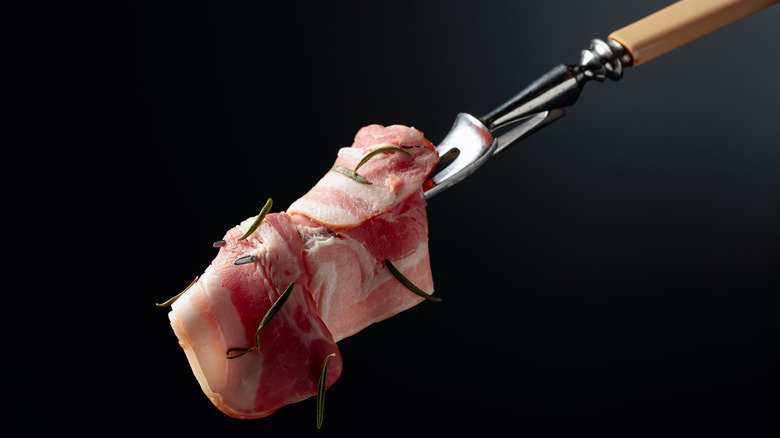What Happens To Your Body When You Eat Bacon Every Day
We don't know if you've heard, but people really like bacon. The cured meat is a staple in kitchens and restaurants pretty much everywhere you go. And in the U.S., despite increasing trends towards meat-free diets and lifestyles, there's still no stopping bacon's popularity, with an astronomical 268 million Americans revealing they ate bacon in 2020, according to Statista.
Why is this the case? Simply put: "It's because everything tastes better with bacon," as Ray Riley, the longtime director of Texas A&M's Rosenthal Meat Science Center, told Meat Poultry in an article that pointed out that 70% of U.S. restaurants feature bacon on their menu. But unfortunately, everything good comes with a price, and all that salty, fatty goodness that bacon provides can have an impact on your body — particularly when you're eating it on the regular. So what exactly is that impact, and how could your daily bacon fix be affecting you in more ways than you know? Join us here at Health Digest as we take a deep dive into the frying pan to find out.
You'll consume a large amount of sodium if you eat bacon every day
So much of the lip-smacking goodness of bacon comes from its combination of savory meat with a super-salty taste. What this means, inevitably, is that bacon is pretty high in sodium — higher than you might expect. Four slices of thick-cut bacon will contain, on average, 880 milligrams of sodium, a sizeable 40% of the recommended adult daily intake, according to Time.
That's a fair amount of sodium in one whack. Take in your other daily food intake into account, and it's easy to exceed the recommended intake. "The reason we recommend a limit on sodium is because it's associated with a risk of high blood pressure as well as stroke," Lisa Cimperman, a registered dietitian at University Hospitals Cleveland Medical Center, told Time. An as the Harvard T. H. Chan School of Public Health pointed out, high levels of sodium in the diet can also lead to a heightened risk of heart disease, kidney damage, and osteoporosis. If you're eating bacon every day, keeping an eye on the rest of the sodium in your diet could be a very wise move.
You'll get a decent amount of vitamins and minerals
Bacon is traditionally thought of as a bit of a junk food, but that's largely due to the combinations you sometimes find it in. In fact, bacon contains a pretty good vitamin and mineral content and, as part of a balanced diet, it can help your body get the nutrients it needs.
Bacon, like a lot of other meat sources, is an excellent source of B vitamins (specifically vitamins B1, B2, B3, B5, B6, and B12), according to Verywell Fit. B vitamins are essential in the maintenance of cell function and helping convert food to energy, as Medical News Today revealed. In addition, bacon is a particularly good source of phosphorus and selenium, with phosphorus helping your kidneys filter waste effectively and to strengthen your bones and teeth, and selenium providing your body with a strong antioxidant that helps to reduce the impact of free radicals on your cells.
This cured meat is also a great source of potassium, which helps your health in a variety of ways, including through supporting bone and muscle strength, cardiovascular health, and the maintenance of healthy blood pressure (via Healthline).
Eating bacon every day could mean that you're consuming a fair amount of nitrates
Nitrates are compounds made up of oxygen and nitrogen, which are naturally occurring in some foods and the human body. However, they can also be added to foods, like bacon, to preserve them (per Healthline). When heated, they can change in composition, becoming either nitrites or nitrosamine, which can have harmful and potentially cancer-inducing effects.
Bonnie Taub-Dix, registered dietitian nutritionist, told Livestrong, "When nitrates are exposed to high heat, especially in the presence of proteins [like those in meat], they can turn into compounds called nitrosamines. It's those nitrosamines that could be dangerous or potentially carcinogenic and grilling or barbecuing processed meats can increase the potential harm from the nitrates in these products."
While other studies have found that nitrates may not be that harmful and while it's important to note that nitrates occur naturally in many foods including vegetables, WebMD revealed that bacon contains quite a lot. You may just want to watch your intake.
Watch your saturated fat intake
Bacon is one of those foods you can't just stop eating after having one piece. However, that's not exactly good for you, thanks to all the saturated fat it contains. Four thick-cut slices will set you back about 8 grams of saturated fat, 40% of your recommended upper daily intake, as Time pointed out, which could set you back if you're eating it every day.
Unfortunately, this gives some medical professionals pause due to the health impacts of eating too much saturated fat. "What we do know is that diets high in saturated fat have been associated with an increased risk of heart disease. About 68% of the calories from bacon come from fat — and about half of those are from saturated fat — so it's definitely not the healthiest meat you can choose," Lisa Cimperman, a registered dietitian at University Hospitals Cleveland Medical Center, told Time. And, according to Medline Plus, eating high amounts of saturated fat can also lead to an increased risk of stroke and weight gain.
Eating bacon every day can supply you with some healthier fats, too
This one could be music to bacon lovers' ears: the fat contained in bacon isn't all bad. Although much is made of bacon's fat content, around half of it is monounsaturated fat. A large part of that comes from oleic acid, the "heart-healthy" acid which gives olive oil its status as a healthy fat, according to Healthline. A further 10% of the fat in bacon is from polyunsaturated fat, which includes omega-3 fatty acids renowned for many health benefits.
Both monounsaturated and polyunsaturated fats are instrumental in helping reduce the levels of "bad" cholesterol in our arteries and delivering the "good" cholesterol that our bodies need to maintain healthy function. However, while it's useful to remember that not all fats are created equal and that a larger proportion of the fat in bacon is not the unhealthy kind, bacon is still comprised of 40% saturated fat. And just because it has some good fats, they don't necessarily safeguard against the bad ones if eaten in high quantities or every day.
Eating bacon daily could have detrimental effects on your eye health in the long term
It's easy to forget, but many of the foods we eat have some impact on our eye health long term — either positively or negatively. Our eyes, after all, are directly affected by the nutrition we give our bodies.
When it comes to bacon and other processed meats, the high levels of sodium present can eventually lead to high blood pressure if eaten regularly. This could lead to a range of issues such as choroidopathy ("a buildup of fluid beneath the retina"), hypertensive retinopathy ("blood vessel damage that causes blurred vision or vision loss"), and neuropathy ("a blockage of blood flow that kills nerves and causes vision loss"), according to WebMD.
In addition, a study published in the British Journal of Ophthalmology found that consuming a "Western pattern diet," which includes higher amounts of processed meats like bacon, may increase the risk of late age-related macular degeneration (or AMD), a condition which can cause vision impairment and loss later in life. The study also found, however, that eating processed meat didn't necessarily link to early incidences of AMD.
Is turkey bacon a healthier alternative?
With the ongoing debate over whether or not white meat is really better for you than red meat, it can be tempting to assume that switching to non-pork bacon, like turkey bacon, could be a healthier option. And on the surface, that appears to be the case: Turkey bacon contains significantly less fat, less saturated fat, and fewer calories than its pork cousin, according to the Cleveland Clinic.
However, it's important to remember that just because this is the case, that doesn't mean it's necessarily healthy. "As with bacon made from pork, turkey bacon is high in saturated fat and sodium — two substances that put you at greater risk for developing heart disease. And the similarities don't stop there," registered dietitian Laura Jeffers told the Cleveland Clinic. The sodium content, in particular, of turkey bacon, is very high: 1,900 milligrams for two ounces, compared to 1,300 milligrams for pork bacon. "Believing it's the better option, you may eat too much," Jeffers added. "I tell my patients to limit bacon products — including turkey bacon — to less than one serving per week in their diet."
Eating bacon daily could increase your risk of certain types of cancer
You may not think much about eating bacon every day, but it's important to consider what the ramifications could be in the longer term. As bacon is processed meat, it means that it goes through processes that change its composition — and this alteration causes the body to process it differently, leading to some long-term risk effects as shown in some studies.
An increased risk of cancer has been observed in studies to be higher when eating processed meat like bacon frequently. A U.K.-based study published in the International Journal of Epidemiology found that higher daily consumption of red and processed meat "was associated with an increased risk of colorectal cancer," and another study published in the International Journal of Cancer examined the link between processed meat and breast cancer risk found a similar association between higher processed meat intake and higher risk. However, it's useful to point out that the latter study found that "red meat was not a significant cause of breast cancer," and that they advised that more studies were needed.
Bacon can keep hangovers at bay
If you've ever woken up with a sore head and a dry mouth, every bone in your body craving greasy, salty sustenance (definitely not us), you'll know how appealing it can be to banish a hangover with bacon. Turns out, there's a strong grounding in the science of hangovers that explains exactly why bacon could help to clear the fog.
"Food doesn't soak up the alcohol, but it does increase your metabolism — helping you to deal with the after-effects of over-indulgence. So food will often help you feel better," Elin Roberts, science development manager at the Centre for Life in Newcastle, U.K.,told the Mirror. "Bacon is full of protein, which breaks down into amino acids. Your body needs these amino acids, so eating them will make you feel good. Bingeing on alcohol depletes neurotransmitters too, but bacon contains a high level of amines which tops these up, giving you a clearer head."
Bacon also contains potassium, which can help with hangovers. While we'd hope you don't have to endure a hangover every day, you might just want to keep a steady supply of bacon nearby for those times you do.
Eating bacon may raise your cholesterol levels
With a large amount of bacon being comprised of saturated fat, eating it daily in significant quantities could lead to a raising of LDL ("bad") cholesterol in your body. "Any animal product is probably going to be high in cholesterol content. That goes from beef to pork to bacon," cardiologist Dennis Bruemmer explained to the Cleveland Clinic. "It's high in fat and will elevate your cholesterol if it's consumed frequently. And [this can] lead to heart problems."
As dietitian Julie Zumpano pointed out, knowing exactly how much cholesterol is in bacon is tricky due to the variables in slice size and fat proportion, but for an average two-slice serving of around 90 calories, you could be looking at around 10 to 15 milligrams of cholesterol. So what if you ate turkey bacon instead? While this would certainly pull the cholesterol level down by around 20% due to turkey being white meat, according to Dr. Bruemmer, he made a good point: "If it's 20% less, it's still 80% more cholesterol than if you weren't to consume it."
Eating bacon daily will give your body a great source of protein
With the vast majority of bacon coming from pork, it's little wonder that eating bacon daily will help you reach — or go beyond — your daily recommended protein intake. Three slices (around 35 grams) of pork bacon will provide you with around 12 grams of protein at around 161 calories, a pretty ample amount to kick off the day with (via NutritionData).
And if you're opting for turkey bacon, you won't miss out on the protein either. A 1-ounce serving of turkey bacon will provide around 8.3 grams of protein at 107 calories, with the turkey bacon naturally being leaner than the fattier pork variety, as NutritionData shows.
Nutritionists, however, are on the fence about whether plant-based bacon can provide the same level of quality protein for the body as animal-based varieties. "I would skip any vegetarian bacon made from 'meat substitutes,' as they often contain processed plant proteins that are difficult to digest," nutritionist Tamar Samuels advised in an interview with HuffPost. Samuels does support one interesting vegan variation, though: eggplant bacon. It might not be super high in protein, but we'll bet it's delicious!
Don't forget about this essential nutrient
There's one element of turkey bacon that is little discussed but could actually prove useful for your health: the levels of choline present. Turkey bacon is a great source of choline, which is an essential nutrient that is vital for several key bodily functions, as WebMD pointed out.
While choline might not be the most well-known of the nutrients, its importance is undeniable. Choline is involved in the production, growth, and maintenance of our cells, being used to produce the fats that comprise our cellular membranes, per Medical News Today. Choline is also used in the metabolism of fats and the support of correct nervous system function, serving, among other things, to convert into a neurotransmitter that helps to regulate our heart rate and breathing. Pork bacon, too, is a good source of choline, according to GB Health Watch. And while it's possible to take choline in supplemental form to help support your health, it's useful to know that eating bacon daily could boost it in your body too.
If you opt for meat-free bacon, make sure to watch your intake
A study led by senior public health nutritionist Clare Farrand for the George Institute for Global Health in Melbourne, Australia, examined the composition of meat-free food products, finding that meat-free bacon can contain a huge amount of salt (via ABC Australia). "Our research found that meat-free bacon has the highest average salt content followed surprisingly by falafels and meat-free sausages," Farrand explained.
She continued, saying that marketing can sometimes mislead consumers. "Many of these products do appear to be healthier largely because of the marketing around the products themselves. We know when something says plant-based or low in something, we have the image in our heads that it's healthier for it because it's made from plants. But ... what it doesn't say on the front of the pack, is that it does contain salt, fat and sugar," she explained. Since a lot of excess salt is added, be sure to watch your intake of meat-free bacon alternatives.
Not all bacon additives are harmful
With bacon already high in fat and salt, the last thing most people would want is to be also facing consuming additives on top of that. But in most instances, additives that are added to bacon are actually done so to make the product healthier to consume, by neutralizing the potentially harmful effects of nitrates or nitrites, which are added to preserve the food to allow it to keep for longer.
Vitamin C and erythorbic acid — both antioxidants — can be added to bacon when it's being cured, to reduce the nitrosamines formed by heat during the cooking process which can become carcinogenic, as Healthline revealed. This effect has been shown in a study published in the International Journal for Vitamin and Nutrition Research, which found that vitamin C can help inhibit the absorption of nitrosamine by the body.
It's important to remember that while additives frequently strike fear into the hearts of consumers, sometimes they're placed in a product for a purpose; but always check the label before you buy, to make sure you know what you're eating.

